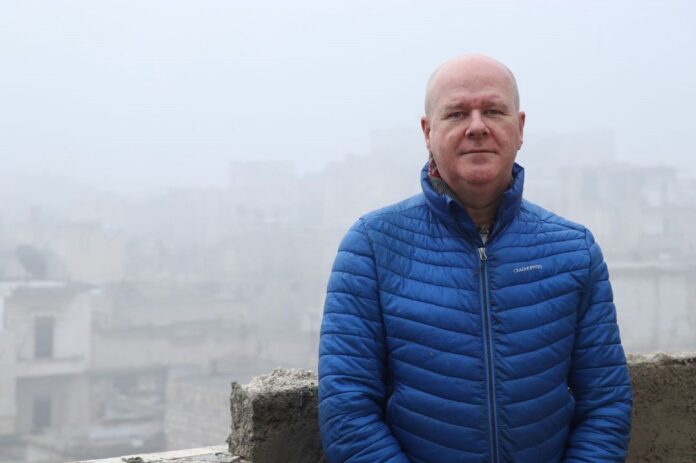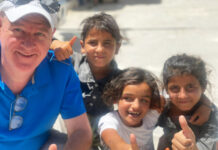
“It’s cold and wet, food is extremely scarce, and people are dying every day.” Those were the words of former Moyross parish priest and head of the Jesuit Refugee Service (JRS) in Aleppo, Fr Tony O’Riordan, as he described the horror of daily life in Syria.
It’s exactly one year on from a 7.8 magnitude earthquake that engulfed Syria and Turkey on February 6, 2023, killing almost 60,000 people.
Those who survived the disaster still face starvation. A lack of medicine for even the basic of primary health issues, little shelter, and a drop off in education are all factors fuelling the ongoing humanitarian crisis.
The UN’s World Food Programme announced last December that it was stopping its main assistance in Syria due to a lack of funds.
‘People forget Syria is a war zone’
Death also stalks the Syrian people in the violence of a long-running civil war under the Bashar-al-Assad regime.
Along with the flattening of its schools, houses, hospitals, and streets, the Syrian pound has also collapsed and plunged the economy into free-fall.
“I think people forget Syria is a war zone and people are dying every day in military activity and conflict,” Fr O’Riordan told the Limerick Post over a crumbling WhatsApp phone connection from Aleppo.
US airstrikes into Syria against Iranian targets and supporting militias last Friday, in retaliation for the deaths of three US troops in Jordan, have intensified the conflict, which has spread into Syria from the fighting in Gaza.
“It has intensified because Syria is seen as a place where anyone with an airplane or a drone can seemingly, with impunity, bomb any part of Syria, and a few weeks ago we had one (strike) very close to where I was living.”
“You never know where the next air strike will be. It’s not carpet bombing but either the missile is not very precise sometimes or the anti-aircraft defence missiles can go anywhere.”
Children pushing trolleys of rubbish
All the while, the people of Aleppo try to recover one year on from when the ground opened up and swallowed their loved ones and their livelihoods.
“People need shelter, food, clothing, heat, everything,” Fr O’Riordan said as the phone line crackled in and out.
“Education has had to drop off the priority list for so many families, many become uneducated, and easily become foot soldiers caught up in the conflict.”
Children with no schools to attend “end up either in the armies or the militias” or running through the city’s bombed rat-runs “pushing trolleys of rubbish” which they hope to sell for 50 cents a day.
“It’s the saddest thing I see here, you can see these children aged as young as five or six in the middle of these big skips sorting through the rubbish to pick out plastic to sell it.
“It’s a miserable scene, they’re on the streets at all hours of the day and night, pushing these trolleys with big nylon bags that dwarf them.”
“They have dirty faces and dirty hands because they are doing hard dirty work – there is an army of those children around Syria.”
Other children are forced to work in clothing factories weaving yarn, “but these are considered to be the lucky ones”.
‘Don’t forget Syria’
The JRS offers safe zones for children, which it has dotted around the conflict areas of Aleppo, which stand as “a place they can be children, where they can get some nourishing food, where we do some basic literacy with them, and get psychological counselling”. However, this too is under threat from funding deficits.
Gripped by daily horrors, Fr O’Riordan celebrates the little victories: “I met a one-year-old boy wearing a fantastic smile the other day, he is here because we managed to provide medical assistance to his pregnant mother whose entire family was lost in the earthquake last year.”
Fr O’Riordan has overseen JRS distributing of food assistance to over 44,000 people since last year’s earthquake.
However, in an SOS call for more funding, he asked the international community “not to forget” Syria, as conflicts in Ukraine and Gaza also require their attention.
“I’m deeply concerned for the present situation and future of Syria, and while we have delivered very important help it has been done on a treadmill of a deteriorating situation.”
Financial donations to the humanitarian crisis in Syria can be made through the JRS Ireland website on iji.ie/donate.









